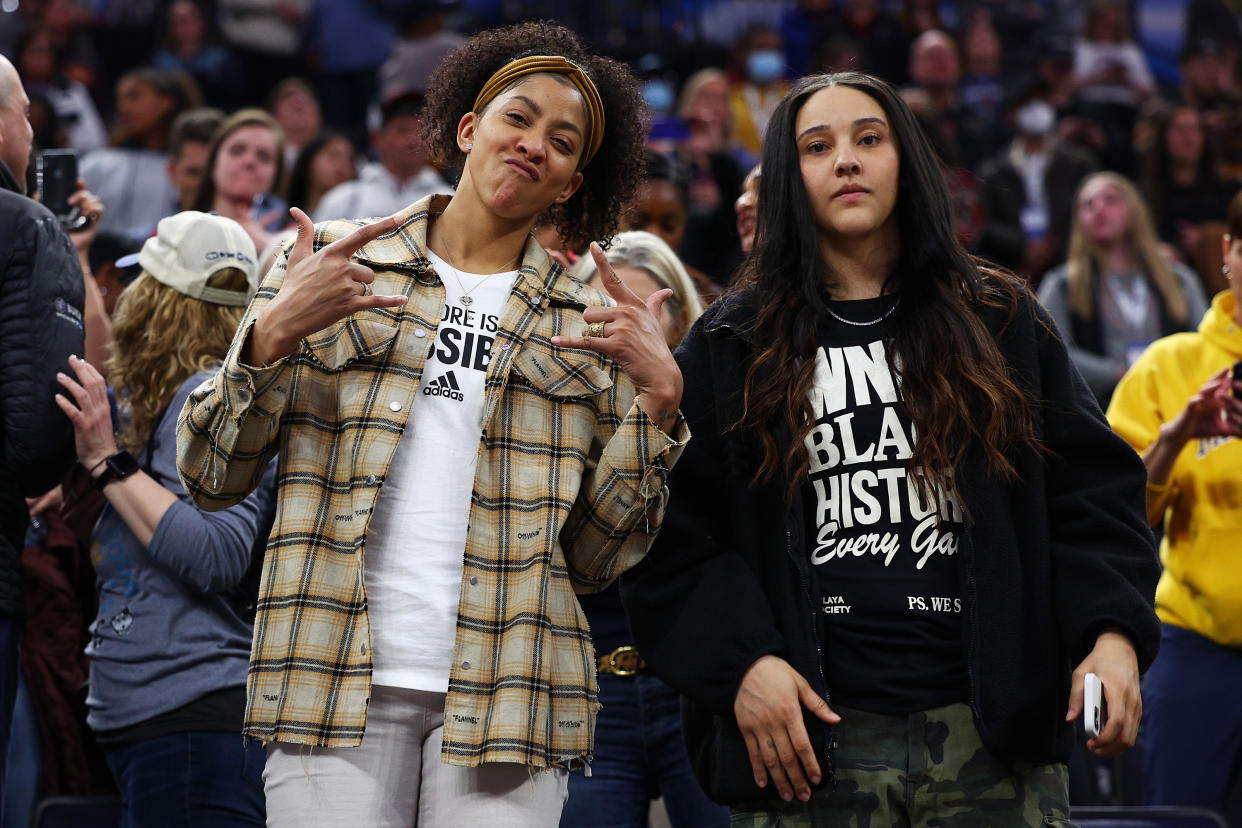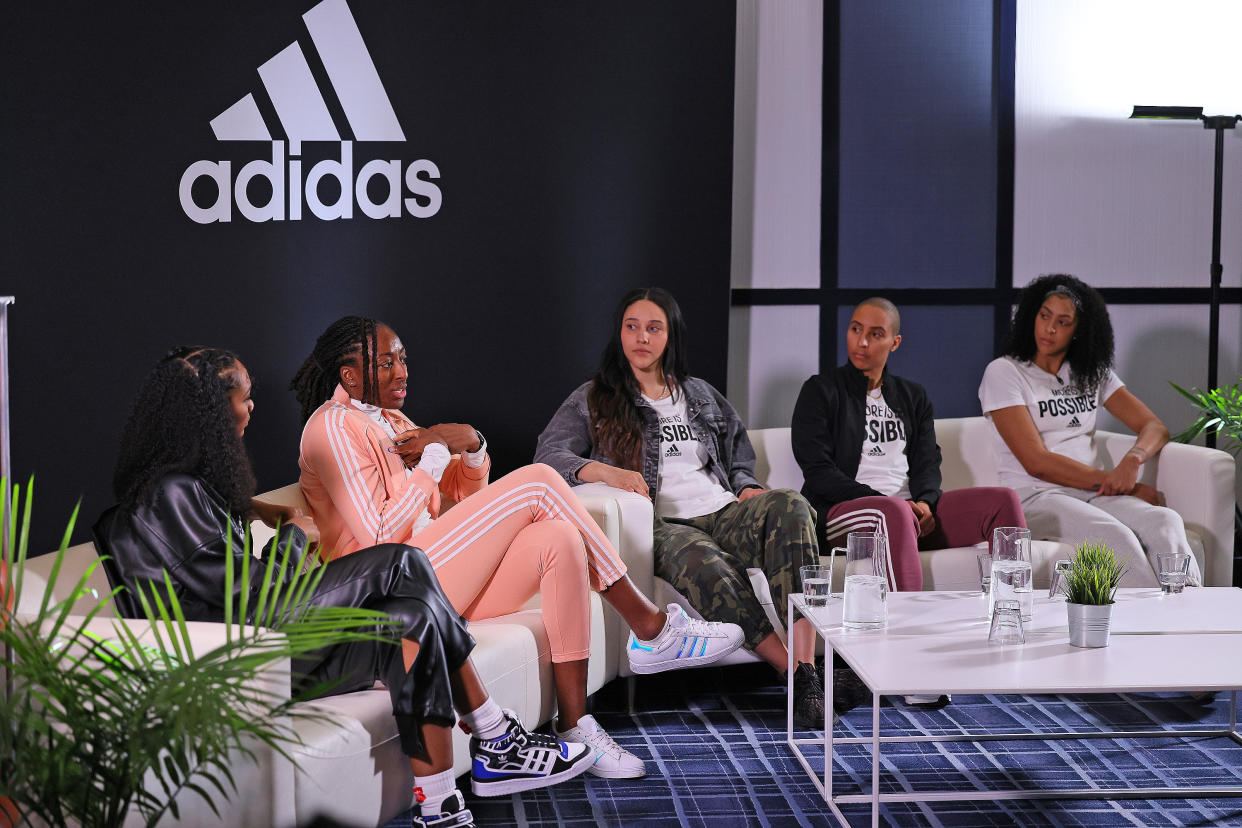'This is not a 1-800 number': WNBA stars view next step as cultural relevance
“Why couldn’t it be a Candace Parker jumper?”
It's a throwaway line by Penny Proud in the rebooted “The Proud Family: Louder and Prouder” on Disney Plus, but the significance behind it isn’t lost. The tween is quick to question her father’s assertion of male basketball players as the default, a stark contrast to a misogynistic WNBA reference the original TV show made 21 years ago.
Of a long list of things Minnesota Lynx guard Layshia Clarendon wants to see as a reality rather than a possibility — better pay, chartered flights — it’s this part of it. The cultural relevance the league has long lacked.
“I wish it was a reality that culturally we viewed men's and women’s basketball the same,” they said at an Adidas roundtable discussion during the women's Final Four in Minneapolis earlier in April. “So therefore we would afford the same investments and resources then, right? … People view your product basically the way you treat it, the way you invest in your business.”
The league is seeing a shift in its cultural relevance due largely to the 2020 bubble season when it gained notoriety for social justice work the players had already been doing for years. In the offseason of its 25th year, stars are making appearances on “Wild ‘N Out” and announcing their pregnancies in People Magazine. Minneapolis was stuffed full of WNBA talent at Team USA camp, on Sue Bird and Diana Taurasi’s ESPN-hosted Megacast and courtside with the game’s next group of pro superstars. The spotlight is on the WNBA in ways it rarely has prior.
That light remains dim, though, and often pointed only at what the operator wants it to show. Parker, the reigning Chicago Sky champion forward, was in the house at Target Center for the national championship game, but cameras didn’t promote her until Aliyah Boston professed her fandom on the mic. Kelsey Plum got in her shots on “Wild ‘N Out,” only to be hit with another attempt at a WNBA attendance joke. Not to mention the quarter-decade of ways in which the league, sponsors and even players have, in the words of two of its stars, boxed themselves in to their own detriment.
“It’s not a charity to invest in women’s basketball,” Parker said from the Adidas couch with Clarendon, Natalie Achonwa and WNBA Players Association president Nneka Ogwumike. “And I think that’s the perspective that has to shift when these companies call and they’re like, ‘How can we help?’ This is not a 1-800 number. Actually invest properly in women’s sports and then from there we can see if it will succeed. Everybody knows, if you don’t invest in something — scared money don’t make money.”
WNBA hits it 'cool' in 2020
If a person plucked off the street knows two things about the WNBA it’s probably the orange hoodie and social justice pursuits, both cultural touch points of 2020. The year started with photos of Kobe Bryant in the hoodie alongside his daughter Gigi following their deaths in a helicopter crash and ended with the WNBA flipping Georgia’s senate to the Democrats. The league was suddenly “cool.”
“For our society to see women and specifically the WNBA positioned as, ‘Oh s*** the orange hoodie? Why don’t I have an orange hoodie?’ ” Clarendon, entering his 10th season, said. “People started getting that frantic, like, celebrity culture frankly. Like I want to be in on the in.”
Even though the players were no more cool than they ever had been or more socially conscious — this conversation happened in the same city of another historic social justice stand for the league — the WNBA became “incredibly culturally relevant,” said 11-year Los Angeles Sparks veteran Ogwumike. It was an expert confluence of events: Fans wanted to honor Bryant and his passions, the WNBA was the first U.S. sports league to start up after the COVID-19 shutdown and the political nature of the country held everyone’s attention. Those holding the sports-centric spotlights had little choice but to fully shine it on them.
“If we have white men in the back saying, ‘No, that’s not cool,’ who control the media, the exposure, the accessibility, what chance do we really have?” 2016 MVP Ogwumike said. “But if you put a sweatshirt on Dwyane Wade, Gabrielle Union, on Beyoncé, now all of a sudden people are like, ‘Oh, I want a sweatshirt, I want a sweatshirt.’ We didn’t do anything different.”
But the league is not only those things nor does it want to be known for only those things.
“Now moving forward, outside of the political gains that our country may have gotten with our efforts, we can’t still box ourselves in to that and just be available when people need us to flip a Senate seat again,” Ogwumike said. “We did that because we’re about that, like [Clarendon] said. We’re about that. We didn’t do it because we wanted to create a documentary. That’s what we live. We’ve been like that all day.”
What can help break them out of a box is doing a better version of what stuck them there in the first place. Yes, it’s marketing.
'We need more product'

It’s difficult to be front and center in pop culture when people struggle to find your games on TV and can’t wear your merch around town for others to see. Good luck finding two-time WNBA champion Parker's league gear, even in Chicago where she won the city its first title last autumn. The only thing that comes up for Clarendon or Achonwa is a custom jersey design that costs more in money and time. And forget having options.
“It’s brands investing in athletes and being able to put us at that forefront and so that people know,” second-year Minnesota Lynx forward Achonwa said. “We always have this runner that it’s, ‘Well, women’s basketball is not fun’ or ‘The merch is not going to sell,’ but you’ve never been offered these opportunities. You’ve never been offered these products. How do you know that nobody wants to watch it if you don’t put it on TV? … We don’t have any merch on our sites any more because it sells out. But it wasn’t offered before, so how do you know people aren’t going to buy it if you don’t provide it?”
“It’s still not there,” Parker interjected. “We need more product.”
People are watching the few games available to them on national TV and they are buying up merchandise when new and in stock. Those viewership and sales numbers don’t need to be as high as the NBA, a league that celebrated 75 years in 2021-22, to still be a success. That they’re as solid as they are without investment and focus is a feat that should be looked at on its own merits.
Parker, who gave a TED Talk on not allowing oneself to be placed in a box, wants to find a way to break out of comparing the “25 years young” women’s game to the men’s game while still being able to “celebrate being dope and different.” But she wants to make sure the ways in which they’re different are good ones that don’t take away from that positive cultural relevance.
That might look like more intimate arenas where fans can pack in and get loud. It is not, at least for many players including Parker, the $1 million coaching salary for Las Vegas Aces head coach Becky Hammon while the entire team’s salary cap is around $1.3 million.
“There is never in the history of a league that has been successful where the coaches make more than the best players. It does not ever happen,” Parker said. “So in the areas that we shouldn’t be different we’re different. And it’s to our detriment.”
Investment will lead WNBA into culture

The next step for the WNBA will be to simply be. Worldwide sports networks will discuss their games, GOATs and storylines. Singers will drop WNBA names in lyrics, and celebrities will wear the W jerseys. Forget “1-800” calls by businesses looking for a slight public relations boost on the guise they support women’s sports. Companies will clamor to be associated with it for the clout and prestige. It will be as much a part of the life and culture as any men’s league.
“It always comes back to that cultural relevance, which comes from the investment in us,” Clarendon said. “Make cool product, people want to wear cool product, put us in Super Bowl commercials. And that comes from companies not just saying ‘diversity, equity, inclusion.’ Put your f***ing money where your mouth is. That’s what we need.”
That takes initial investment by companies like Michelob Ultra including Ogwumike in a Super Bowl ad as nothing more than another athlete, no rah-rah women empowerment required. All too often the narrative is still women should be happy to be there and the viewers should be, too.
“We have to understand that when we see people doing great things in women’s sports, it no longer has to feel like it’s a surprise,” Ogwumike said. “It needs to be normal. It needs to be something that is expected.”
The national championship game the night of the Adidas roundtable reached an 18-year viewership high. When ESPN released the numbers, a section of fans and big media social accounts shared it with a version of the lowercase/uppercase mixed letters, “but no one watches women’s sports.” It’s an often-used sarcastic hit at another old trope people use to box the league in and allege it’s lesser. Ogwumike told Yahoo Sports she doesn’t necessarily view those types of things as hurtful, “but I definitely think that it keeps things stagnant.”
“It needs to be, in my opinion, more action and less words especially if you’re digging deep for those moments that maybe you’re holding a grudge over,” she told Yahoo Sports following the roundtable. “I don’t see the value in rehashing those types of things, and I don’t see it actually helping the brand. I don’t see it helping investment.”
Culture begins with the people and what they view as cool. Investment will be what lifts the WNBA, whether that looks like advertisements, sponsorships or writing the main character of a hit show in a Sky jersey over a Bulls one. The goal is that the next “The Proud Family” reboot won’t question the default of men as the athletic comparison or have to hit down at incorrect assertions. A reference about the WNBA or its players will stand on its own. Simple as that.
